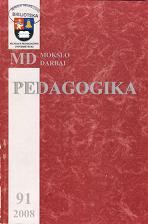Universitetinių studijų akreditavimo tikslai: akademinės bendruomenės požiūrio tyrimas
Purposes of University Studies Accreditation: Research of Academic Community Attitude
Author(s): Rima ZablackėSubject(s): Education
Published by: Vytauto Didžiojo Universitetas
Keywords: university studies accreditation; accreditation purposes; accreditation functions
Summary/Abstract: The paper focuses on the analysis of the purposes of higher education accreditation process in Lithuania and other European countries. Therefore the aim of the paper is to reveal the diversity of purposes of university studies accreditation and to research the attitude of academic community towards these purposes. Methods applied: analysis of scientific literature and higher education policy documents; a questionnaire survey was used to test the point of view of academic community members (820 respon-dents); interviews and openended questionnaires helped to find out the opinion about the accreditation procedures for university studies in Lithuania and other European countries (Spain, the United Kingdom, Slovenia, and Latvia) (22 respondents). The first part of the paper analyses the diversity of purposes of university studies accreditation presenting points of view of different researches and analyzing the experience of Lithuania. In the second part the results of a questionnaire survey, interviews, and openended questionnaires are analysed. The conclusions are presented in the end of the article. Analysis of the research data has helped to prove the statement by R. C. Dickenson (2007) that institutional purposes, rather than public ones, still predominate in the processes of university studies accreditation: the quantitative and qualitative researches show that respondents see quality control and quality improvement as the most relevant purposes. Public accountability and ranking of higher education institutions are perceived as the least important purposes of accreditation. As R C. Dickenson (2007) states, all this is not to suggest that institutions are ignorant of the public purposes of accreditation, but a system that is created, maintained, paid for and governed by institutions is necessarily more likely to look out for institutional interests. The results of the researches have shown that Lithuanian academic community members confirm the significance of the unity of quality improvement and control in the process of university studies accreditation. Representatives of academic community set twofold goals for university studies accreditation process - quality improvement and control, which requires the unity of these goals when preparing assessment methodologies and procedures.
Journal: Pedagogika
- Issue Year: 2008
- Issue No: 91
- Page Range: 14-19
- Page Count: 6
- Language: Lithuanian

